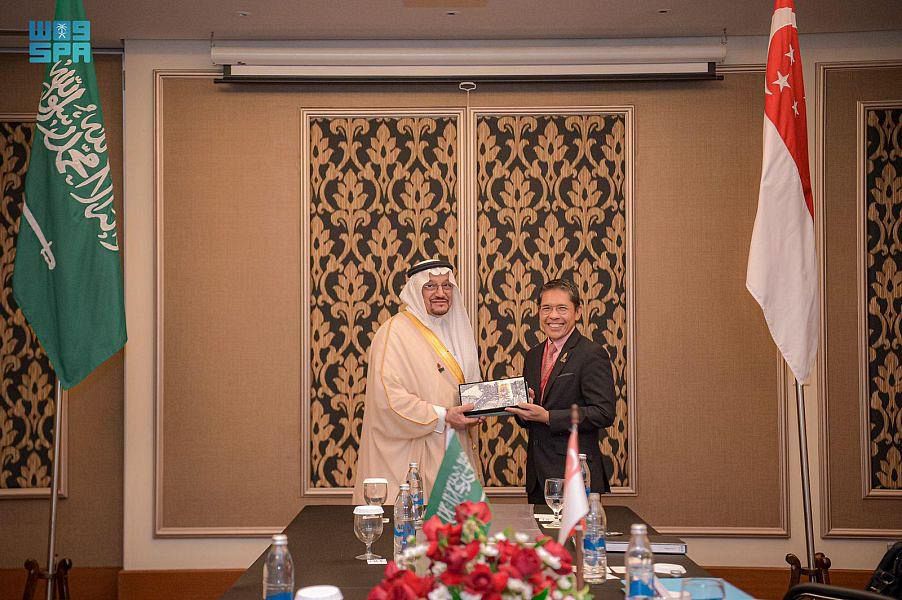
RIYADH: Saudi Education Minister Dr. Hamad Al-Sheikh on Sunday stressed the importance of “qualitative, flexible education” and finding ways to overcome challenges through “creative planning, resilience, and quick implementation.”
He made the remarks at the opening ceremony for the International Conference and Exhibition for Education, which is being held in Riyadh.
The ICEE is one of the largest education forums to be held in the Middle East since the start of the COVID-19 pandemic, with a focus on contemporary issues in education, opportunities for developing education, and exchanging expertise and experiences to enhance global competitiveness.
One of the event’s main aims this year is to boost investment in the Saudi education sector.
Al-Sheikh said one of the Kingdom’s long-term goals was to enhance human capital, a goal that was in line with the objectives of the crown princes Human Capacity Development Program.
“As part of the Kingdom’s 2030 Vision, we hope to make our aspirations a reality by enabling every citizen in our country to realize their full potential,” he told the conference. “We will attain this goal by equipping our students to be global competitors and strong social and economic development building blocks. Through lifelong learning, they will be able to keep up with new technical and professional breakthroughs.”
He said the sector must not lose sight of obstacles and how to solve them, despite the educational resources available.
The minister underscored the importance of transformation because of its impact on a persons cognition, emotions, abilities, and values. He said that man and culture, the local community, and the global community were all entwined in this relationship, necessitating access to flexible and high-quality education.
He also spoke about the difficulties associated with economic conditions, factors, and global crises, which demanded innovative planning, swift adaptation, and well-balanced execution.
He said it was essential to understand global variables to keep up with advancements in the education sector and adjust to and influence such circumstances before they become detrimental.
He described the conference as “a worldwide opportunity to provide innovative solutions and non-traditional alternatives, face the challenges, and develop value-added recommendations for education.”
Dr. Ahmed bin Salem Al-Amri, the rector of Al-Imam Mohammad Ibn Saud Islamic University, said the institution had worked hard to improve program quality, get most programs accredited locally and internationally, and achieve Vision 2030 objectives aimed at raising the universitys position in international rankings.
It was recently listed in the top 200-300 in the world in the Times Higher Education Impact Rankings for the UN Sustainable Development Goals for 2022.
He told the conference that the institution continued to work hard during the pandemic and had achieved remarkable research results. The most notable was an increase in the number of publications last year.
The rate of faculty publication had increased to one paper per faculty member each year. It highlighted the universitys desire to foster a conducive atmosphere for research, encourage accomplishment and innovation, and raise its profile locally, regionally, and worldwide.
Ahmed Al-Nashwan, chairman of the conference’s scientific committee, told Arab News last week that the event would focus on “urgent issues in education, presenting opportunities for developing education, and exchanging expertise and experiences that reflect the desire for global competitiveness.”
Sunday’s sessions saw the participation of UAE Minister of Education Hussain Al-Hammadi, Egyptian Education Minister Dr. Tarek Shawki, the UK prime minister’s special representative to Saudi Arabia for education Sir Steve Smith, and Dr. Jaime Saavedra, global director for education at the World Bank and Peru’s former education minister.
The ICEE runs until May 11 and addresses the theme of “Education in Times of Crises: Opportunities and Challenges.”
It discusses incentives for investment in the sector and solutions to overcome crises and challenges facing education as a whole. Improving the Kingdom’s institutions to reach international standards and indicators will also be on the agenda.
It is being attended by 110 local and 152 international exhibitors, local and global educational institutions, universities and international education centers, officials from the Ministry of Education, heads of public and private universities and their employees, and education experts from around the world.
On Monday, there will be discussions on global leadership to transform education, digital transformation in education, e-learning in the Kingdom, quality assurance, accreditation and ranking of e-learning, recent trends in teaching and learning, and curriculum development.







